AI in Recruiting and the Explosive Growth of AI Search: What You Need to Know
In today’s fast-evolving digital landscape, AI is reshaping how we interact with information and technology. One of the most striking developments is the rapid expansion of AI search, a shift that promises to redefine not only how we find information but also how industries like recruiting leverage artificial intelligence for greater efficiency and insight. This article dives deep into the latest data on AI search growth, the competitive talent wars among tech giants, and the complex geopolitics influencing AI’s future—all with a focus on how AI in recruiting and other sectors is being transformed.
Presented by The AI Daily Brief: Artificial Intelligence News, the insights here highlight both the opportunities and challenges that come with this technological revolution.
The Unprecedented Surge of AI Search Traffic
AI search is no longer a niche experiment; it’s growing at an astonishing pace. According to market intelligence firm Datos, AI-powered search accounted for 5.6% of all US search traffic last month. While this may seem modest compared to traditional search engines, the growth rate is the real eye-opener—it has doubled in just one year.
When examining early adopters—users who have integrated large language models (LLMs) like ChatGPT into their everyday browsing—the numbers become even more striking. Datos began tracking a cohort of such users in April of last year and found that visits to LLM-powered search now represent 40% of that group’s browser usage, up from 24% a year ago.
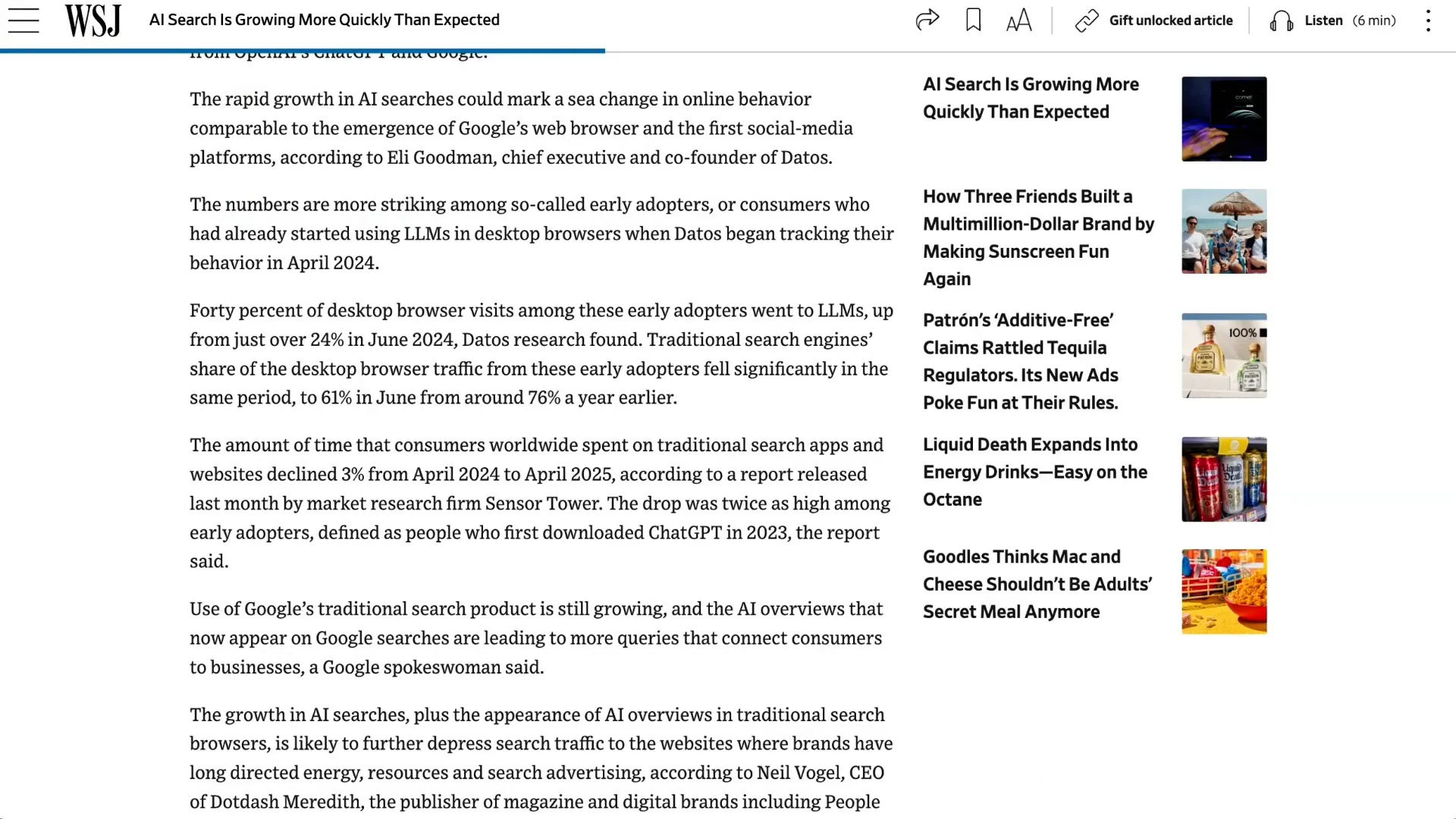
This data excludes searches where Google's AI-generated summaries satisfy queries without redirecting users from the traditional search interface. The implication? The trajectory strongly suggests that within a few years, LLMs will likely become the dominant form of search.
Eli Goodman, CEO of Datos, describes this as a sea change comparable to the launch of Google and the rise of social media platforms. It’s not merely switching search engines; it’s fundamentally rethinking how we engage with the internet.
From Destination to Discovery: The Shift in Search Behavior
Goodman highlights a crucial distinction in search intent. Over 90% of AI searches are informational or productivity-oriented, such as “Help me solve this problem” or “Help me answer this question.” Traditional search, by contrast, often focuses on navigating to a specific website or destination.
This shift is particularly relevant for marketers and recruiters who rely heavily on search engine optimization (SEO) to attract candidates and clients. The rise of AI search necessitates a new approach—sometimes referred to as “generative engine optimization”—that tailors content for AI-driven queries and conversational interfaces.
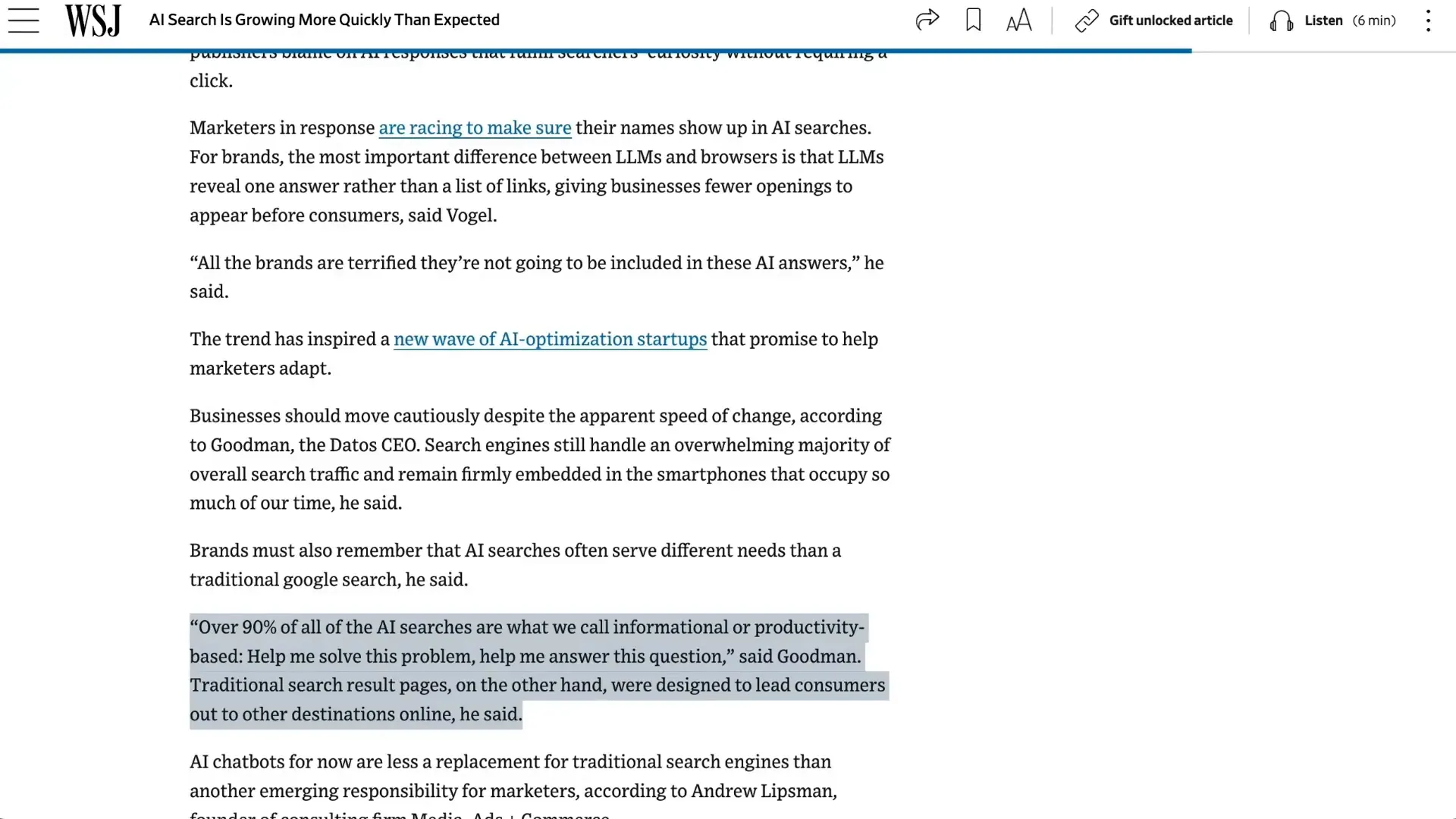
Will AI Search Replace Traditional Search? A Look at Industry Perspectives
There is a lively debate about whether AI search will replace traditional search or complement it. Some experts, like Andrew Lipsman, founder of consulting firm Media Ads and Commerce, draw parallels to the mobile internet boom. Initially, many feared mobile would cannibalize desktop usage, but the reality was additive: mobile surged while desktop remained stable.
Could AI search follow a similar pattern? Because AI search often serves different purposes—such as deep research and complex problem-solving—it may emerge as a new pillar alongside traditional search rather than a direct replacement.
This differentiation is critical for recruiters. AI in recruiting can harness these AI search tools to perform nuanced candidate research, generate tailored communications, and automate routine inquiries, all while traditional search continues to serve as a discovery mechanism for job listings and company information.
ChatGPT’s Explosive Usage Growth and Market Impact
One of the biggest drivers of AI search’s growth is ChatGPT, with users sending over 2.5 billion prompts daily—a staggering figure that approaches one trillion requests annually. OpenAI shared these numbers with Axios, revealing that ChatGPT’s query volume is nearing 20% of Google’s annual 5 trillion searches.
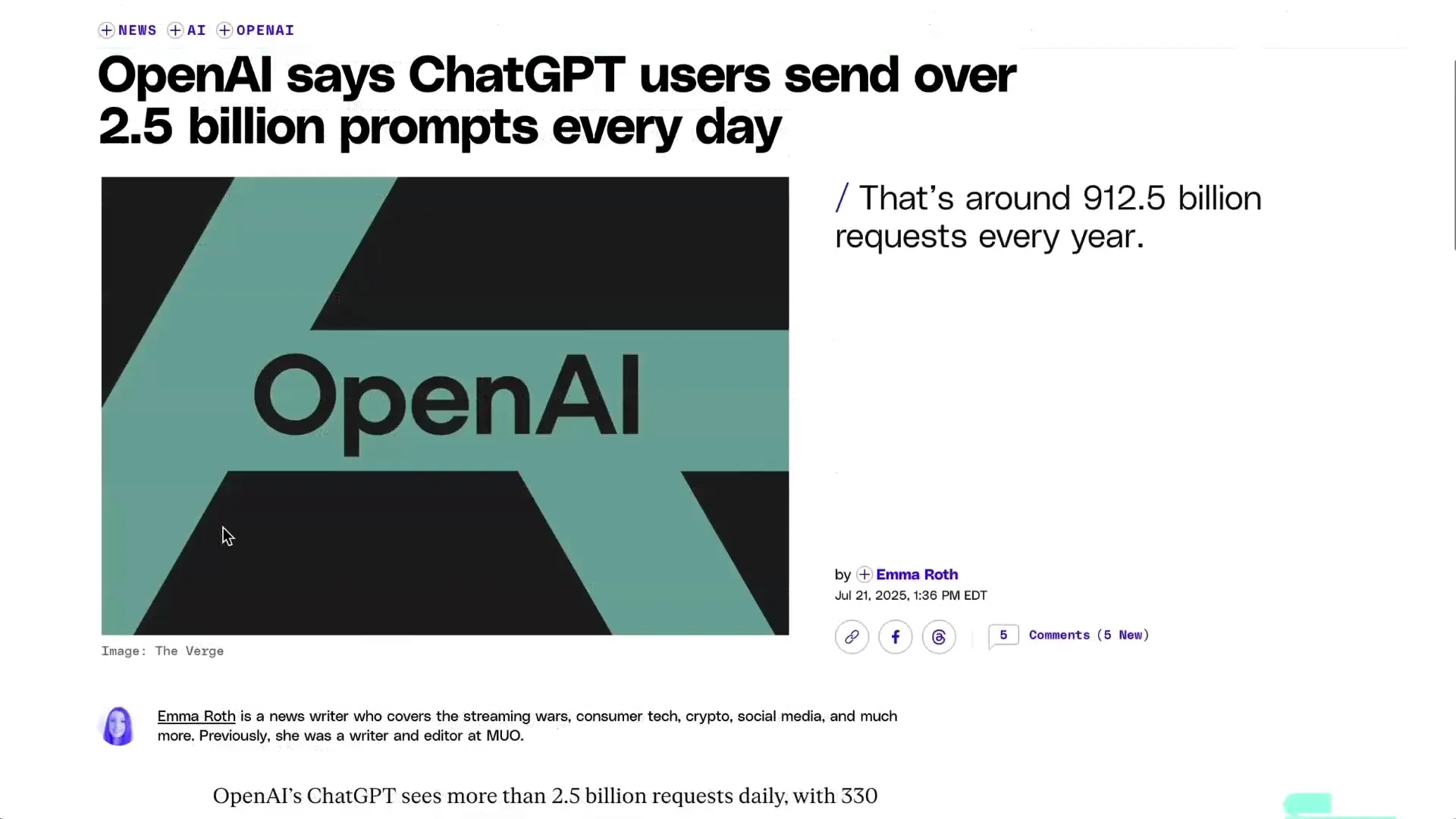
What’s even more remarkable is the rapid acceleration. In December, OpenAI CEO Sam Altman reported 1 billion daily queries; now, usage has more than doubled in just seven months. This surge underscores the growing reliance on LLMs for information and productivity tasks.
Altman’s recent engagements in Washington, including a Federal Reserve event and the White House AI Race Summit, emphasize his vision of democratizing AI’s economic benefits. His stance is nuanced—acknowledging concerns without succumbing to doomsday narratives, focusing instead on broadening access and participation.
The Talent Wars Heating Up: Tech Giants Compete for AI Expertise
Behind the scenes, the battle for AI talent intensifies. Earlier this week, OpenAI and Google showcased their prowess by excelling in the International Math Olympiad with AI models. Interestingly, three Google researchers who contributed to the Gemini model’s success were being coached by Meta, which later hired them, illustrating the fluid and competitive nature of AI research talent.
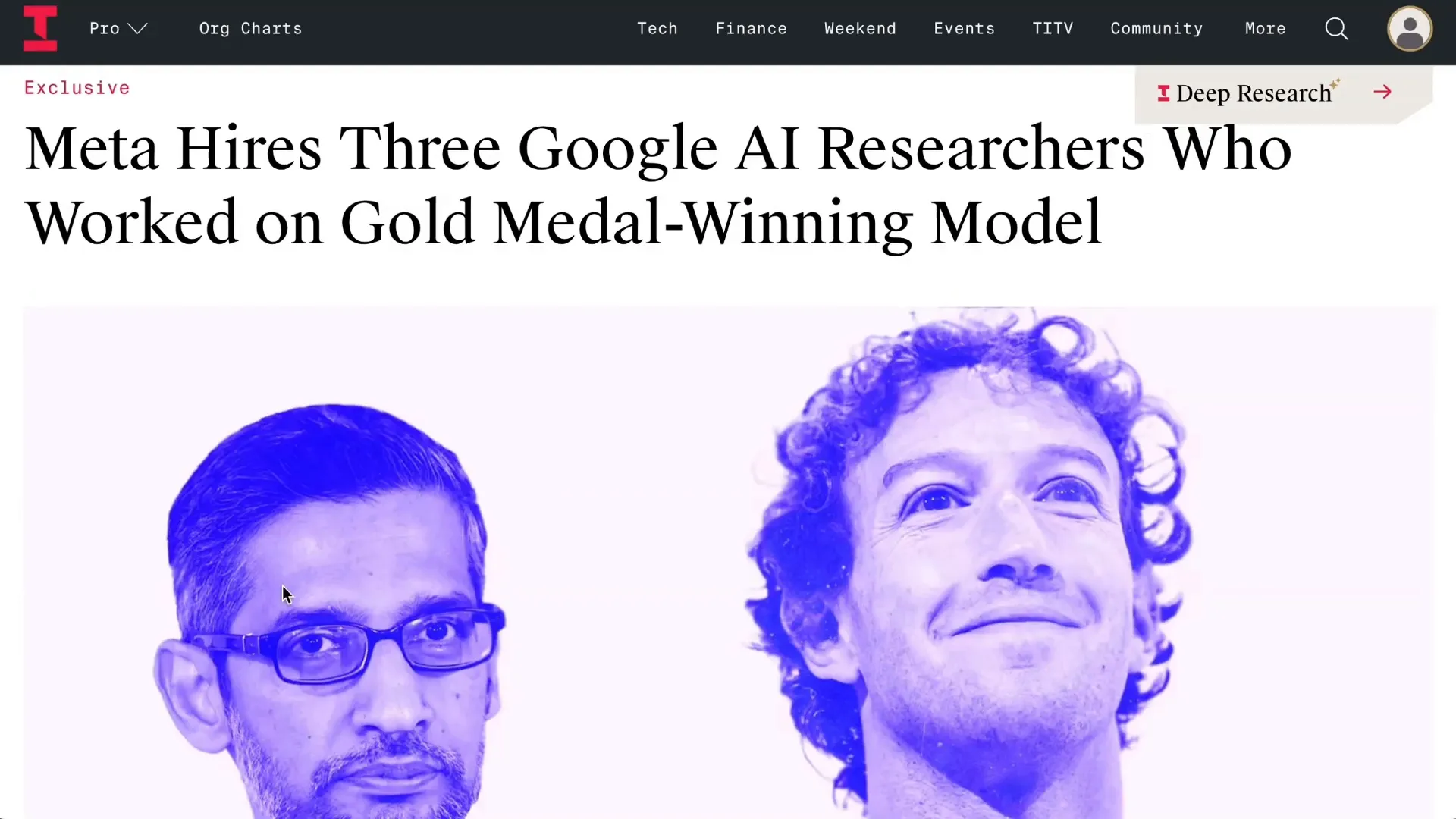
Meanwhile, Microsoft is aggressively recruiting from Google DeepMind, reportedly hiring around two dozen researchers recently. A notable example is Amar Subramanya, a Google veteran and former VP of engineering for Gemini, who joined Microsoft as corporate VP.
Microsoft’s AI CEO Mustafa Suleiman, himself a DeepMind cofounder, is spearheading efforts to bolster the company’s competitive edge in AI innovation.
Amazon’s Strategic Move into AI Wearables
Amazon recently acquired the AI wearable startup Be, known for its watch that listens to conversations and generates summaries or transcripts. The product is priced at $50, undercutting many competitors.
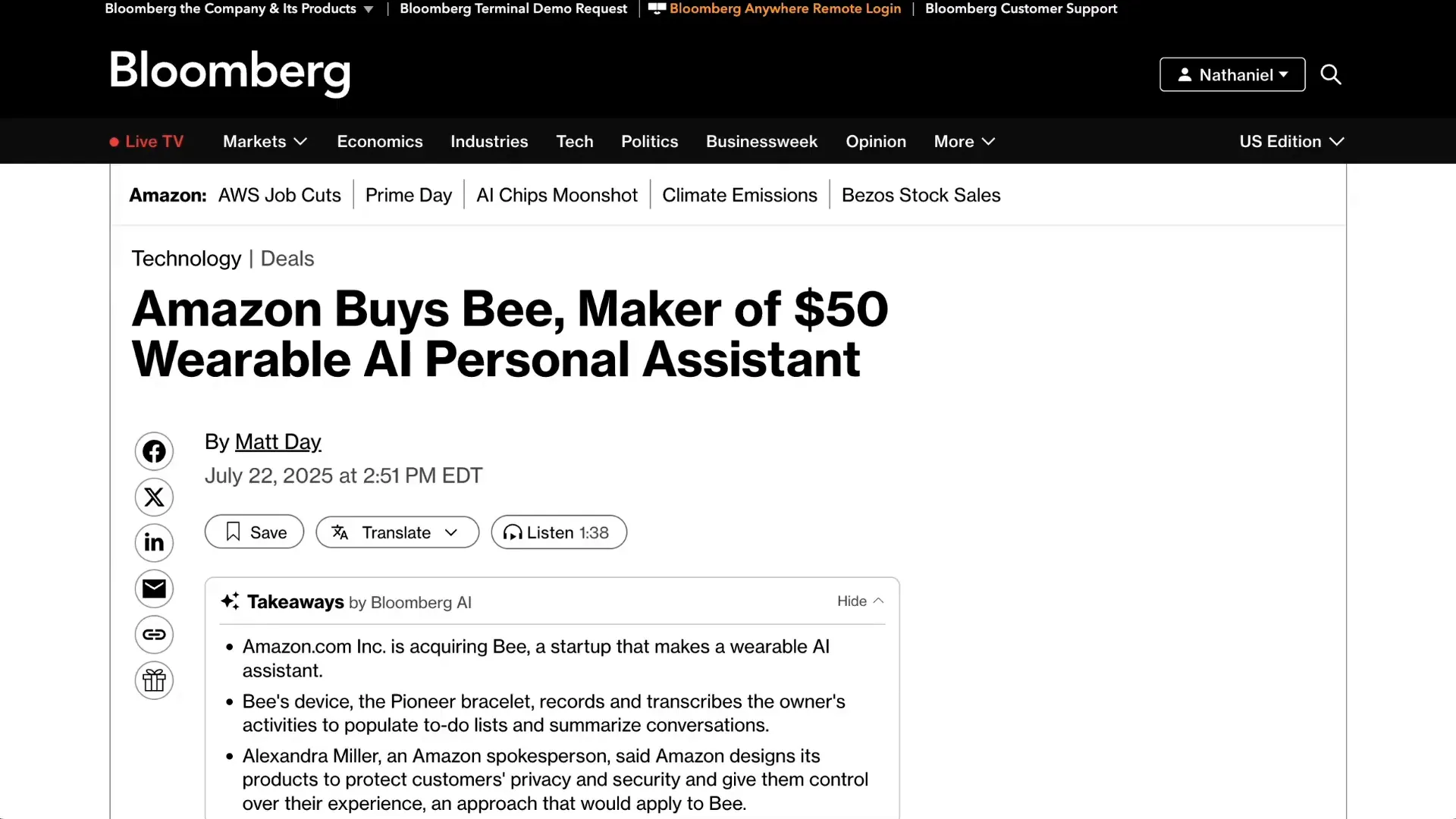
While the deal’s financial details remain undisclosed and the transaction is yet to close, Amazon has extended job offers to Be’s employees, suggesting a hiring strategy rather than an immediate product launch. Given Amazon’s ongoing challenges with Alexa’s performance, bringing in talent specialized in Ambient AI is a smart move to enhance their AI ecosystem.
Geopolitics and AI: Anthropic’s Controversial Shift
Beyond technology and talent, AI’s future is deeply intertwined with geopolitics. A leaked memo from Anthropic CEO Dario Amodei reveals a significant policy shift: the company is now open to accepting investments from Gulf states, despite previously opposing data centers in that region.

Amodei candidly acknowledges the moral dilemma, noting that such investments could enrich “dictators,” a real downside he does not relish. Yet, he concludes pragmatically that refusing such capital is unsustainable if Anthropic wants to remain at the AI frontier.
The memo highlights the vast financial resources in the Middle East—estimated at over $100 billion—and the disadvantage companies face if they don’t tap into it. Anthropic’s position reflects the complex trade-offs companies must navigate between ethical standards and competitive survival.
The Challenges of Communication and Public Perception
Amodei also discusses the communications headache this decision creates, with media and social platforms quick to accuse hypocrisy but often lacking nuanced understanding. This tension illustrates the difficulties AI companies face in balancing business realities with public expectations.
The Gulf region’s strategic position between the US and China adds layers of complexity, influencing not just AI investment but broader geopolitical dynamics that will shape the coming decades.
Implications for AI in Recruiting and Beyond
What does all this mean for AI in recruiting? The explosion of AI search and conversational AI tools like ChatGPT offers recruiters powerful new ways to source candidates, analyze resumes, and engage talent more personally and efficiently. As AI search becomes a dominant way to access information, recruiters who adapt to these tools will gain a competitive edge.
Moreover, the talent wars underscore the value of human expertise behind AI systems. Recruiting top AI talent is crucial not just for tech companies but for organizations looking to integrate AI into their operations effectively.
Finally, the geopolitical realities remind us that AI development doesn’t happen in a vacuum. Ethical considerations, funding sources, and global alliances all influence the technologies we use—and by extension, the tools recruiters have at their disposal.
Conclusion: Navigating the Future of AI Search and Recruiting
The rapid growth of AI search is more than a technological trend; it’s a fundamental shift in how we interact with information and technology. With tools like ChatGPT processing billions of queries daily and companies fiercely competing for AI talent, the AI landscape is dynamic and full of opportunity.
For recruiters, embracing AI in recruiting means not only adopting the latest technologies but understanding the broader context shaping these innovations—from market dynamics to geopolitical considerations. Staying informed and adaptable will be key to leveraging AI’s full potential in hiring and beyond.
As the AI revolution continues to unfold, the integration of AI search and conversational tools will redefine recruiting strategies, enhance productivity, and open new avenues for connecting talent with opportunity in ways previously unimaginable.